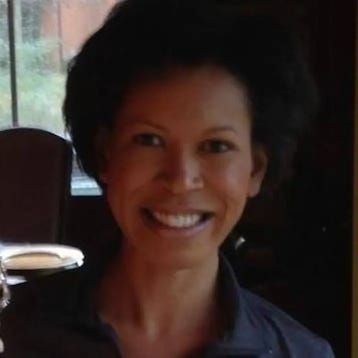✍🏾In Her Words: What Is A Patriarchal Reversal And What Does It Have To Do With Rape?
Guest Contribution by Jocelyn Crawley
The Peachy Perspective will occasionally feature guest posts from fellow Southern radical feminists whose voices sharpen our fight for women’s liberation. This inaugural In Her Words brings you Jocelyn Crawley, a radical feminist in Atlanta. Her contribution examines how patriarchal reversals distort reality to blame women instead of men—and why feminists must reject these lies outright.
Although discursive formations which exist for the purpose of challenging and refuting the logic of patriarchy oftentimes incorporate references to patriarchal reversals, they do not necessarily connect the reality of these reversals to sexual assault. Yet radical feminists should explore these connections for a plethora of reasons; one of those reasons pertains to the importance of continually recentering the reality of sexual assault so that the patriarchy can cease its efficacy in the colonizing process of erasure. With these realities in mind, I wish to explore the relationship that exists between patriarchal reversals and rape. First, I wish to offer a bifurcated definition of the term. Next, I will suture these two definitions together for the purpose of producing one new cohesive explanation of patriarchal reversals. The first definition of a patriarchal reversal is articulated on the Exiled Stardust Blog:
“patriarchal reversals happen when a man, or a woman who has aligned herself with men, asserts that feminists are guilty of X when in fact it is men who are guilty of X. It’s a projection, a verbal sleight of hand that seeks to distract from what the patriarchy is doing by putting women in a defensive position.”
To paraphrase, patriarchal reversals transpire when men and/or male-identified women argue that feminists are culpable for the creation or perpetuation of gender-related problems when it is in fact men, who typically operate as anti-feminists, who engender or contribute to the proliferation of egregious challenges that result from the existing inequities between men and women. I wish to expand this part of the definition of patriarchal reversals by asserting that they involve men accusing any woman, not just feminists, of being culpable for gender-related errors. This distinction is important because, although most women identify as neither feminists nor radical feminists and rather choose to ideologically and materially align themselves with men in ways that perpetuate the patriarchy, they still regularly articulate ideas which convey irritation–and even ire–towards the reality of male supremacy. They thus place themselves in forms of arguments with men in which they accuse males of sexist behavior only to have these men invert the accusation by asserting that they–women–commit the error. In her delineation of what patriarchal reversals are, Exiled Stardust asserts that an example would be the assertion “Radical feminism is all about money.” This assertion suggests that the primary purpose of individuals who operate within or support radical feminism is to generate wealth. However, she points out, it is the patriarchy which makes its primary interest the exploitation of resources. This includes not only capital but also time, ideas and labor. Within the gender-based framework in which this argument is articulated, the extraction of resources is from women for men. (Although, I might add, another dimension of this extraction is from poorer men to richer men.)
The second component of the definition of patriarchal reversals comes from Mary Daly. It reads:
“the idea that Eve came from Adam is a reversal. It’s ridiculous. Who could believe that? It’s contrary to all biology. But with that myth in mind, people can justify somehow the idea that God is male. And therefore that male is God. And that he’s the origin. But he’s not the origin. The Bible is full of reversals. There are reversals everywhere. Orwell thought that when he wrote in 1984 about Doublethink. You know, the Ministry of Truth was where they made up lies, the Ministry of Love was where they tortured people. Everywhere you go there is Doublethink. There’s ‘natural’ make-up that of course is unnatural. Or think of ‘pro-life’. When they say ‘life’ they mean ‘death’.
With this definition, the feminist philosopher explains that patriarchal reversals involve constructing realities which are meant to operate as truths yet cannot because of their inconsonance with the material, living world. These inventions of reality transpire in gender-based contexts when they are referred to as patriarchal reversals; when a non-gender related inversion of reality transpires, it is simply a reversal.
When the reader considers the existing definitions and modes of thinking about what a patriarchal reversal is and can be, I have devised a new definition: a patriarchal reversal is a cognitive process which involves reorganizing material reality such that, irrespective of the epistemological and experiential underpinnings of a situation which clearly demonstrate that men are ideologically or materially culpable for an attitude or action, women are identified as possessing the attribute of culpability. Although patriarchal reversals surface in a plethora of gender-related contexts, it is important to notice their presence and prevalence in context of rape given that the legitimacy and acceptability of physical violation of female bodies by males is the core tenet of male supremacy. I will provide two examples of this from the important essay “Being Silenced: The Impact of Negative Social Reactions on the Disclosure of Rape” by Courtney E Ahrens. In this essay, Ahrens notes that “Rape survivors who speak out about their assault experiences are often punished for doing so when they are subjected to negative reactions from support providers.” She provides several examples,one of which I will discuss here for the purpose of elucidating how cultural responses to rape constitute a patriarchal reversal.
Example:
Rita. Rita's ex-boyfriend invited her out on his boat where he and one of his friends assaulted her at gunpoint. She remained in a state of shock for three days and then contacted her church's prayer line who told her she must have wanted it to happen:
Well, they told me that…that situation could not have occurred unless I’d attracted it by thinking about it … they said, probably, it must be in your subconscious.
In this example, a woman is raped by a male. (We can assume that the friend who participated in the assault was also male, but this information is not given.) The patriarchal reversal transpires when, instead of attributing blame to the male individual who is responsible for the sexual violation, culpability is applied to the female victim. Here, material and epistemological reality have been (re)organized such that one person’s violation of another person’s physical body does not lead to forms of knowing which involve an understanding of rape as an occurrence in which the rapist is defined as categorically wrong for his actions. Rather, the individual who has been raped is somehow wrong. In the case of Rita, the reorganization of culpability away from the perpetrator of the crime and to the victim transpires within a fallacious framework of reasoning. This flawed framework involves a religious community asserting that, through subconscious cognitive processes, the victim attracted the event of rape to herself.
It is not necessary to provide more examples of this type of faulty logic to indicate that it exists. For many years, feminists have pointed out that blaming the victim for being raped, rather than asserting that the rapist is culpable, functions as an integral element of rape culture. Additionally, many people, including individuals who are not ideologically aligned with radical feminist processes and praxis, have noted that the argument “It’s her fault” is regularly deployed for the purpose of ensuring that rapists are not held responsible for their actions. However, it is necessary for me to point out that this form of faulty logic is not only an aspect of rape culture but also a patriarchal reversal given that there doesn’t appear to be substantive, extensive discourse regarding the connection between blaming women for being raped and the ideological framework radical feminists devised to convey how men intentionally and continually invert reality in ways that dehumanize women. Yet this discourse should exist because ideological inversions play an integral role in shaping the subconscious and conscious thought processes of individuals, thereby subtly or saliently impacting the way that they analyze situations and with whom they sympathize and align themselves with upon conducting their analyses.
In summation, rape continues to exist as the most integral element of male supremacy. As such, radical feminists must continue to examine both its existence and how discourses created about it work to sustain patriarchy and male privilege. In completing these examinations, feminists can become more effective and expedient in summarily rejecting any and all arguments that are rooted in patriarchy and its ongoing work of devaluing and dehumanizing women.




